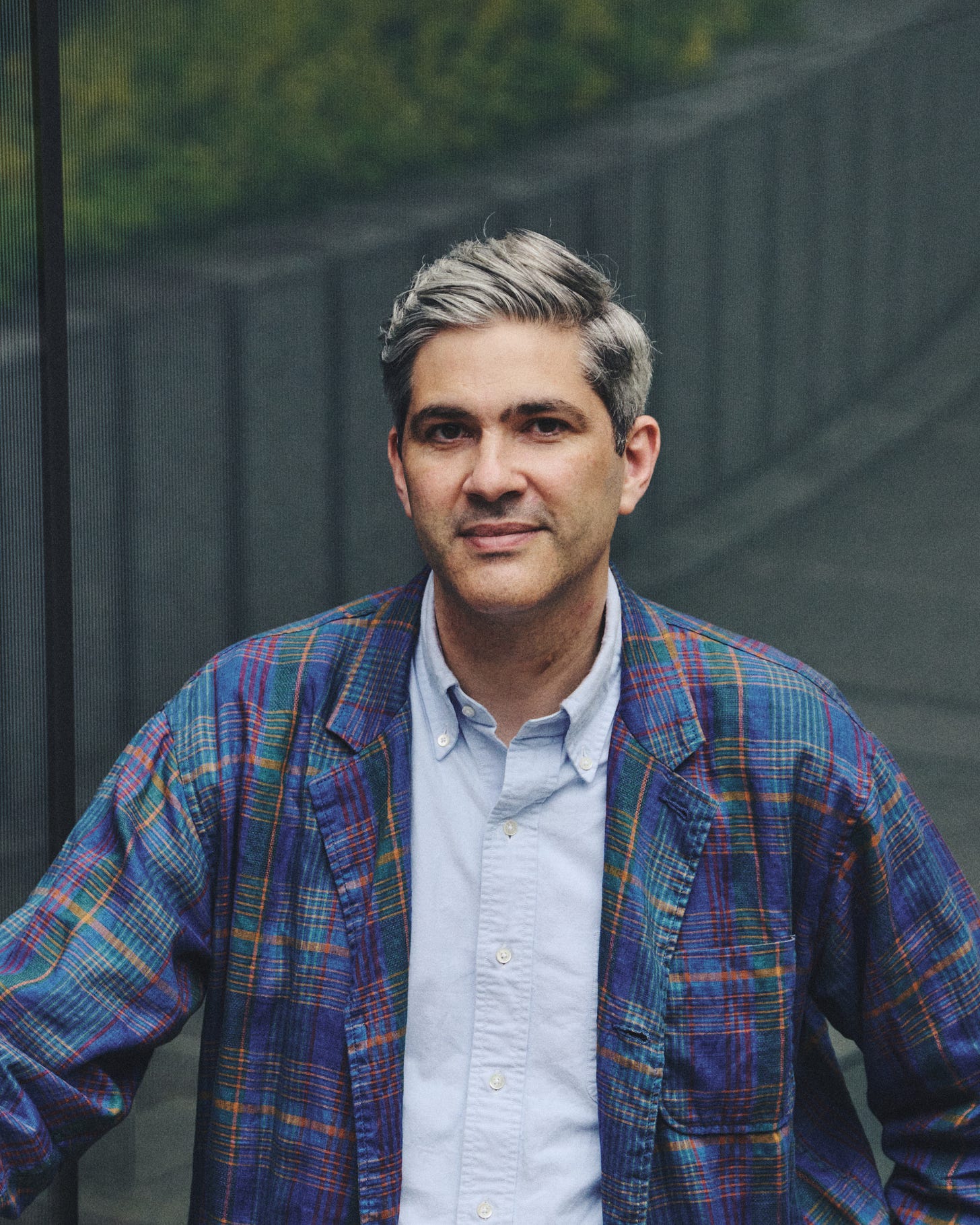The internet promised creative abundance. We got stagnation.
W. David Marx's new book Blank Space explains how the 21st century abandoned artistic innovation for profit and entertainment.
Elea.notes is a newsletter about tech, writing and creativity. If you haven’t subscribed, join me.
🇮🇹 Last weekend, I attended a gala in a palazzo in Venice, hosted by an organization that’s been around since the First Crusade. As we danced beneath centuries-old paintings, my Campari-addled brain wandered to a question: what art created in the past few decades will still be around in a hundred years? Will the future Italian elite boogie next to Beeple?
⬜️ If we’re to believe cultural critic W. David Marx, not much. In his new book, Blank Space: A Cultural History of the Twenty-First Century, out next week, David argues that the past 25 years have seen a dramatic decline in creative innovation. Weaving through a sprawling cast—from Taylor Swift and Psy to Elizabeth Holmes and Mr. Beast—he makes the case that culture has become “a vehicle for entertainment, politics, and profiteering—but at the expense of pure artistic innovation.”
🎨 I’ve known David since my time in Japan, and I was especially eager to hear his perspective on tech’s role in culture. This edition will be longer than usual, but the conversation is worth it. Here’s our talk, condensed for brevity and clarity.
The book is named for a Taylor Swift song, and I think she, more than anyone you mention, embodies your hypothesis about culture over the last 25 years. Talk me through that.
I mean this in a non-pejorative way, but I think Taylor Swift does represent where culture has been in the last 25 years: entertainment, rather than mind-altering art. You can throw it on and take value from it. It immediately hits you with the hook.
She’s done something that culture in the past tried not to do, which is to repeat itself. The music writer Jaime Brooks pointed out that “Shake It Off” is just an imitation of Pharrell Williams’ “Happy”…If you listen to “Blank Space,” it leans on Lorde’s “Royals” quite a bit.
Culture doesn’t even have to be artistically minded, but it was always something new — a new sound, a new feeling that really marked the era. Taylor Swift has created a business based on looking at what was successful and replicating that, rather than trying to be a forward trend.
If you go back to the Beatles’ catalog, they were obsessed with always twisting the convention a little bit. Taylor Swift is really good at creating works that fit existing conventions, then marketing those and meeting her audience where they are.
A lot of the book centers around musicians who embody this marriage of entertainment and profit. Did you feel like you were writing about a lot of music?
Absolutely. Growing up in the 90s, music was central to everything; the clothes that you wore were based on the kind of music you listened to. MTV was the center of youth culture.
In the last 25 years, music has lost its center of culture. And yet, if you were to describe the main characters of the last quarter century, you would hit musicians: Beyoncé, Jay-Z, Kanye. And you can’t talk about the diversification of global culture without talking about K-pop.
Music embodies a phenomenon that’s beyond just the music itself…Taylor Swift’s innovation is in the lore of Taylor Swift — you dig through the hints to figure out who the ex-boyfriends are…there’s the celebrity angle, the experience of going to see a live show, your speculation about their future careers, the books, the fashion brands…
Paris Hilton made some music. While that wasn’t how she showed up, she strikes me as a pop star. We just didn’t even need her to make music; she could go off and do the same thing Britney was doing. Britney dominated pop culture for a couple of years, not because she was releasing music, but because she was hitting paparazzi cars with an umbrella and had a shaved head.

Similarly, I’m a huge Blackpink fan, but I think most of their music is bad. Instead, I love all the things around them, which seems like a new kind of fandom.
It feels more Japanese, like being a fan of Johnny’s acts; the music is not the point. It’s the whole phenomenon, and the whole investment in being a fan.
The stereotype of a music fan used to be a scrawny, white indie guy. If a new album came out, you would sometimes hate it, even though it was your favorite artist. You would have these big debates about whether it was good or bad.
The model in Japan has been more: if you’re a great fan, you buy it. There’s no real value judgment about whether it’s good or not. “Stan” culture is much closer to that.
Then, in the American model, [stan culture] becomes very defensive and very aggressive — we’re going to destroy anyone who says anything otherwise. I was shocked when the new Taylor Swift album came out, which was not universally loved. The New Yorker had a headline that said, “Taylor Swift might not be capable of making a bad record…”. I thought that was so incredible, because no one in 1984 would have written that Bob Dylan is incapable of making a bad album.
I’m a Dylan fan, and he has had some clunkers.
Not only are fans taking that perspective on the music, but critics also have accepted the idea of someone like Taylor Swift. It’s an automatic assumption that whatever she does will be incredible, which is a new kind of thought about pop culture.
I appreciated that in the book, you describe how these changes in how we value culture actually happened before the internet was as widespread as it is now. I also believe that a lot of the current polarization has its roots far before the spread of social media, for example.
That’s a really important point to me, and was only notable to me in writing a history of this period rather than an analysis.
These trends are catalyzed and exploded by the internet, but they start beforehand. I think the actual century begins as a backlash against the rise of liberal inclusivity and neoliberal economics and its alliance with center-left politics. What polite society believed in the ‘90s moved from a parochial, more or less center-right, patriarchal, conservative church-bound view of society to a more “the healthier thing is to let people be who they are.” Meritocracy, education, and all these liberal upper-middle-class values became established as polite society values, and there was much more tolerance and excitement about being inclusive.
Once that became established as the new hegemony of politics and the economy, transgression became more anchored to right-wing values. It’s this transgressive, liberating act to go off and say a racial slur. That really starts with Vice magazine and Gavin McInnes, and then it continues, obviously, through 4chan and the current President of the United States.
On the other side, center-left politics did not solve everything, and economic inequality became much worse. So on the left, you have stronger movement also against liberal ideas towards identity politics. Then identity politics swallows culture as well.
Francis Fukuyama’s book Liberalism and Its Discontents is exactly about this process. We have the same thesis, which is more or less that the 21st century is best explained as a backlash against centrist liberalism that established itself as the new hegemony. Culture follows that same direction, and that starts before smartphones ever enter the picture or the internet is used by anyone other than a professional class of people on desktop computers.
How does that manifest itself in a trend like poptimism, another theme in the book?
There’s still this raging debate within music criticism about poptimism…But I really do believe that, whether you call it poptimism or a pro-pop ideology, it’s anchored to ideals of liberal inclusivity.
If you had gone to college in the ‘90s, as many of these critics have done, and they were in literature departments or cultural studies departments, they would have read Pierre Bourdieu and learned this Kantian ideal of art: that art is this detached thing in your brain…that there’s this hierarchy of high and low, and that is a tool of class suppression.
So it makes sense that if you then are told, “Radiohead is good because you listen to it in your head, but hip hop is bad because it’s just dance music,” you would say, “That’s very unfair, because people are getting this incredible value of going to the club and listening to the songs and…wait, there’s a lot of real innovative beat making in hip hop.”
Poptimism came from an obvious and good place, which is to say, if we’re applying this destruction of hierarchies to our entire understanding of global culture, it needs to happen within criticism as well. We need to take pop music seriously…to take Ashlee Simpson as seriously as Radiohead.

So when Addison Rae came out with an album this year, all the reviews said things like, “Her best lyrics are her dumbest lyrics.” “She’s the best when she realizes that she’s just an ingredient.” Long story short, poptimism came out of an ideological place, but it morphed to create a new set of standards for judging art.
Let’s go back to what you said about the internet accelerating these trends.
Social norms are held in place by punishment. If you’re a celebrity and you do something outrageous — let’s say this is the 1990s, you get removed from mass media. You’re gone, and that’s it.
The internet allows you to move around social norms, because it’s an unregulated space. Hardcore pornography, even if it’s allowed in society, is not in the middle of a city; you have to go to a certain store to buy it. And now the internet allows anybody, anywhere, to access hardcore pornography.
When the [Paris Hilton] sex tape came out, a leaked tape that her ex-boyfriend very aggressively and disgustingly tried to monetize, how was it sold? It wouldn’t be sold in a pre-internet era at all. Maybe it’d be put on a videotape, and there would be third-hand reports of it. When it was put on the internet, the clips leaked to video sites, and anyone could see them.

Technology always creates a new unregulated area where social norms can’t be enforced. At the very beginning, this was celebrated because social norms were seen as the way that conservatives crushed human liberation…And then misogyny and racism and anti semitism flourished on the internet, and there was no way to punish it except to cancel people.
All these canceled stars aren’t really canceled. They’re just living in this alternative economy, and they’re still connecting with their fans. The quantification of culture, global distribution speed…the internet had a big role in all those things, but I think the norm-breaking part of the internet is something that people think about less.
But the internet imposed other norms — clicks and likes.
Popularity was still the key [in the past], but there was enough ambiguity that critics and gatekeepers could say, “This is popular but terrible, and this is really good, and people need to see it, and so we’ll amplify it.”
Once you get to an objective and pseudo-democratic model — the people have spoken, and they want to see this attractive young woman who’s not wearing very much do a video and not this art video — then it’s very hard to make the same argument to gatekeep.
Second, if your business model is based on being paid by the number of clicks or the number of impressions, you’re going to maximize your content strategy for that. So, as you’re doing the gatekeeping, even if you still put your thumb on the scale for things that represent your taste as an editor, you can’t completely discount the other things.
The interesting long-term consequence of the internet is that we felt that if you give tools to more people to create, destroy barriers and expand distribution, you will only have positive outcomes. I think the outcomes have mostly been negative, and that when you destroy all the other criteria because criteria are elitist, you move to a model in which the most raw mob mentality wins out and/or whatever makes the most money wins.
There will still be a winner, there will still be a narrative, it’s just that it will probably be based on a set of values that are less productive and ideal for society.
Let’s talk about your take on AI in the book. You say that even before generative AI tools, we already had too much content, and challenge the idea that it’s something really new from that perspective.
This was written before Sora, in the Suno age, when there was a lot of bad music being created. I don’t know if I worry about Suno’s bad music against the other one. But with Sora, when anyone in the world can hit a button and make anything, and it looks pretty much like the thing that you want it to look like, video becomes massively and totally devalued. You will never want to watch anything again.
If you go to someone’s house and they put out their IKEA plates, and you don’t say, “How did you create this plate? This is incredible.” But if you went to a Japanese ryokan and they had something much more crafty, you would look at the bottom, see the name, and admire it.
I thought the worst that could happen was we would be a little bored, but I think human experience and human labor are going to be massively revalued, and you’re going to want to see things in real life, because everything on a screen is possibly fake.
If you had to write a chapter going into 2026, what would you add?
I think people are bored with putting the internet more into their lives. Culture is moving back to small spaces, private clubs, restaurants, and real experiences. Purely digital things have become devalued — the NFT seems like the peak of that.
The smartphone is no longer a status symbol. It’s a social obligation machine and a time-wasting machine put together.
Tech is no longer solving these easy problems. There was a time when you’d think, “I wish I knew where I was, and I wish I knew how to get where I want to go.” And then someone built a map that constantly refreshed with all the world’s geographic information, constantly updated—and that was incredibly helpful. But once that exists, there isn’t another set of problems we all share where we think, “I wish they could solve this.” We’ve really hit the maximum of what consumer tech can do to help your daily efficiency.
In general, the shine has worn off of technology, and there’s just this already a move away from it, and away from AI that I’m actually quite optimistic about. People are rediscovering that there’s just more value in tactile, analog experiences.
Next steps:
📚 Check out David’s other books: Ametora: How Japan Saved American Style and Status and Culture: How Our Desire for Social Rank Creates Taste, Identity, Art, Fashion, and Constant Change.
🏙️ For the City Boys and City Girls: David also recently translated a fully English edition of the iconic Japanese magazine, Popeye.
🎄 Send me your favorite cultural moments of the last 25 years. My vote is for low culture moment is the Merry Chrystler girl, high culture is In The Mood For Love.
Thank you all for reading! Next week, look out for an interview with a games industry insider on how tech is changing gaming and localization. And if you’re not subscribed, come along:




